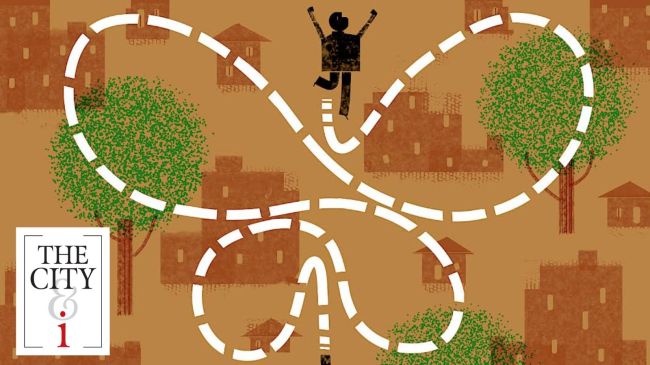Opinion Is it a home if it only exists in the imagination?
Cities barely figured, either in life or the imagination. Even when they rudely shoved their way into my life by way of the exigencies of work, they remained peripheral to my thought. My experience of them was that of a transient, flitting through and making do for a few years
 Just as one can have an intimate relationship with a city, it’s also possible to have none at all.
Just as one can have an intimate relationship with a city, it’s also possible to have none at all. “Delhi is awfully dry,” explained a Belgian man who had lived and worked in the city for many years when asked why he was moving back home. When a friend told me this anecdote, I could instantly relate. The enforced greenery was oxymoronically brown, the leaves never glistening with the bounty of the monsoon or the much-maligned rains that nourish the beauty of the English countryside of my teenage years.
There were other sorts of dryness, too: The local branch of a famous Chennai-based eatery whose masala dosas — too crisp, with an entirely alienated filling sitting awkwardly somewhere inside — lacked what an empathetic friend described as “the creamy oneness of the masala and the dosa”. The mausoleums of kings long gone, who had never conquered as far as the land of my ancestors, rose detached from the unartful, modern cityscape. The sea was further away than it had ever been. Even the heat was, perhaps fortunately, dry. The only relationship to be had with such a place was an equally dry one: Purely transactional, for the sake of a job.
 Chennai for a few years, Amsterdam for a year were, metaphorically and literally, wetter; there was certainly more perspiration in the former. But varying degrees of linguistic and cultural alienation, and above all, reclusiveness and a life lived internally, put paid to any notion of forging a connection. There was much to explore, much that was genuinely of historical, cultural or aesthetic interest, and most of it was left unexplored. There was no inspiration, no capturing of the imagination. Just as one can have an intimate relationship with a city, it’s also possible to have none at all.
Chennai for a few years, Amsterdam for a year were, metaphorically and literally, wetter; there was certainly more perspiration in the former. But varying degrees of linguistic and cultural alienation, and above all, reclusiveness and a life lived internally, put paid to any notion of forging a connection. There was much to explore, much that was genuinely of historical, cultural or aesthetic interest, and most of it was left unexplored. There was no inspiration, no capturing of the imagination. Just as one can have an intimate relationship with a city, it’s also possible to have none at all.
It may be a question of belonging. In the back alleys and crevices of my mind, paved by the cobblestones of one medium-sized town after another — the successive homes of my childhood — there was always a faint but insistent pull towards half-mythical rural roots. Towards family and forefathers, and neighbours who could tell stories of them all. Temples built in time immemorial, always with a pond and a banyan tree, where I might never venture but which should certainly be there. The smell of the Arabian Sea and its waves lapping at the shore. The white sands of my father’s home, the tall trees he had planted and the second-hand memory of the paddy fields he crossed to get to school, which I was born too late to see. The thought of living permanently in that place — no longer truly rural but built up, just another grey, traffic-ridden speck in the giant conurbation that runs the length of Kerala — was always a mere velleity.
Growing up, family and the occasional visit to the family home were the only constants. There were no permanent friends, schools or hometowns, and many years were spent abroad as a “Generation 1.5” immigrant — those who move as children after having spent a few years in their country of birth, but come of age in the host country. Assimilation wasn’t easy; there was an accent, among other things, in the way. National identity evolved, went to war with itself and eventually dissolved into something less proud and more global. What remained was an affinity for a village imagined from afar, a region, a culture, a language and its history; all this became something to cling to in the absence of anything more definite.
Cities barely figured, either in life or the imagination. Even when they rudely shoved their way into my life by way of the exigencies of work, they remained peripheral to my thought. My experience of them was that of a transient, flitting through and making do for a few years. There was certainly no sense of belonging to one, of knowing all its ways and secrets. I can live in a city for years without making a true home. Does that mean one can have a home that exists only in the imagination, and that there are other ways of belonging, beyond urban and rural, of in-betweens and might-have-beens?
rohan.manoj@expressindia.com






